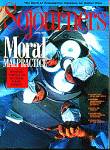Moises Sandoval's On The Move: A History of the Hispanic Church in the United States (Orbis Books, 1990, $9.95, paper) marks an important stride forward in the study of the history of Latinos and the church in the United States, a field that has long been neglected and overshadowed in religious histories of North America.
Already considered a significant work by activists and scholars of the Latino faith-based community, Sandoval's clear, concise book is worthy of a wider audience. He demonstrates that the Hispanic element should be viewed not as an appendage to North American history, but as constitutional to it.
Even for those who know of the disgraceful treatment of Latinos in the United States, the indignities Hispanic Catholics have been subjected to by their own church, as recorded by this book, are shocking. The church's designation of the vicariate of New Mexico in the 1850s as paribus infidelium (the region of infidels) was clearly an affront to the Catholicism that had existed there for 250 years.
On The Move chronicles the two invasions of the Southwest, first by the Spanish in the early 1500s, and later by Protestant Anglo-American settlers in the 1800s. Fueled by the racial, religious, and cultural intolerance of a policy of Manifest Destiny, the second imperialistic assault of the Southwest continues, and has radically affected, in most cases for the worse, the life of Latinos there.
On The Move offers a vibrant interpretation of the role of faith in the La Raza movement of the '60s and '70s, and in the struggles of Cesar Chavez's United Farm Workers organization. The book also includes a poignant chapter by Edwin Sylvester Jr. on the history of Hispanic Protestantism in the United States.
The sections of Sandoval's work that focus on the role that the popular church has played in the region's religious history are the most inspiring. In the absence of clergy, Catholicism in the Southwest was sustained through a "homespun" piety that was considered to be mere superstition by the institutional church.
This parallel church, which has been built upon the devotions that take place around the home altars of many Latino homes (kindled mainly by women), and grassroots religious organizations such as New Mexico's penitentes, have yet to be fully accepted by the Roman Catholic church. Yet Moises Sandoval claims, "It is to them, for the most part hardly literate peasants, that the faith owes its existence in the Southwest."
The liberation of Latinos lies in the unique expression of mestizo spirituality. The appropriate response of the mainstream church is full-hearted acceptance. Acts such as this are the living stones of reconciliation that our church is built on.
Aaron Gallego was assistant editor of Sojourners when this article appeared.

Got something to say about what you're reading? We value your feedback!
